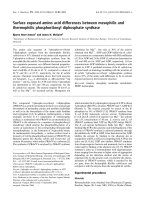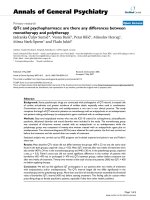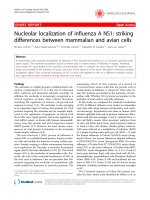Intercultural - Differences between Vietnamese and English Proverbs and Idioms
Bạn đang xem bản rút gọn của tài liệu. Xem và tải ngay bản đầy đủ của tài liệu tại đây (1.32 MB, 19 trang )
Subject: Intercultural Communication
How proverbs convey cultural values
and ethical assumptions in Vietnamese
and those accumulated for centuries by
English-speaking people?
How proverbs convey
cultural values and ethical
assumptions in Vietnamese
Proverbs
are complete sentences that
summarize the people's experience of nature
and productive labor, people and society.
Vietnamese
cultural values arise from the Red
River Delta civilization.
all aspects of the material life and spiritual
life of the people are marked by agriculture.
Vietnamese proverbs have many symbolic
words related to Buddhism.
This religion has an important position in
Vietnamese spirituality.
Character
traits of Vietnamese people
mentioned in proverbs exist both good,
positive personalities and bad, negative
personalities.
Educational aims: teaching people
ethical
assumptions are expressed in family
and social relationships such as loyalty,
respectfulness, sacrifice, compassion,…
Reflecting and praising the precious
characteristics of Vietnamese
Vietnamese proverbs convey:
characteristics in agricultural life
of wet rice cultivation
religion concepts
characteristics of
Vietnamese.
Vietnamese proverb
examples
Proverbs are the summaries of cultural values
Reflect the culture of specific agricultural life
“Con trâu đi trước cái cày đi sau”
"No cơm tấm, ấm ổ rơm“
"Nhất nước nhì phân, tam cần tư giống”
Reflect the influence of Buddhism
“Ăn mày cửa Phật.”
“Ăn cơm Phật, đốt râu Thầy chùa.”
“ Có thân phải khổ về thân”
Proverbs are the summaries of cultural values
Reflect the culture of family, friendship values
‘Chim tìm tổ, người tìm tơng " ‘Một giọt máu
đào hơn ao nước lã"
‘Mẹ con, một lần da đến ruột "
"Học thầy không tày học bạn " " Ăn chọn nơi,
chơi chọn bạn "
Reflect the culture of solidarity
“Góp gió thành bão", “Kiến tha lâu đầy tổ“
Proverbs are the summaries of ethical
assumptions
Reflect
the culture of moral
"Giấy rách phải giữ lề“ “Người là vàng, của là ngãi“
“Lửa thử vàng, gian nan thử sức” "Có cơng mài sắt có ngày
nên kim"
"Ăn quả nhớ kẻ trồng cây" "Một giọt máu đào hơn ao nước lã"
“Nhất tự vi sư, bán tự vi sư”
Reflect
the attitude toward women
“Cái nết đánh chết cái đẹp” “ Chữ trinh đáng giá ngàn vàng”
How did proverbs
accumulate for centuries
in English
Proverbs are borrowed from languages and
cultures similar to English
Many proverbs are taken from The Bible
Others are taken from such diverse sources
as poetry, stories, songs, commercials,
advertisement, movies, literature
Some proverbs are sayings of some famous
person
Some proverbs are the result of people
pondering and crafting language
Proverbs are passed for centuries by using it
in conversation
Proverbs are passed also by literature
Proverbs are passed by drama and films
Proverbs are passed by music
Proverbs are passed by decorative manner
Process of creating and preserving proverbs in
English is always on going
because it is an important part of the
language and culture
English proverb
examples
Proverbs are taken from the Bible
“A
soft answer turns away wrath.”
KJV King James Version, Proverbs 15:1 - A
soft answer turns away wrath: but grievous
words stir up anger.
“Nothing
new under the sun.”
KJV, Ecclesiastes 1:9 - The thing that hath
been, it is that which shall be; and that which
is done is that which shall be done: and there
is no new thing under the sun.
Proverbs are taken from the poem
and stories
“A
thing of beauty is a joy forever”
From John Keats' epic poem, Endymion, 1818.
“A
place for everything and everything in its
place.”
This proverb is variously associated with
Samuel Smiles, Mrs. Isabella Beeton and
Benjamin Franklin. The Oxford Book of
Quotations dates it from the 17th century
“All
that glitters is not gold.”
The popular form of the expression is a
derivative of a line in William
Shakespeare's play The Merchant of
Venice, which employs the line as 'all that
glisters is not gold'.
Proverbs are taken from the songs and
famous people
“A jack
of all trades is the master of
none”.
Jack Of All Trades by Eurhythmics:
“Jack of all trades master of none”.
“At
the end of a rainbow, you'll find a pot
of gold”.
(At) The end (of a rainbow) by Earl Grant.
“Keep
your face to the sunshine and you
cannot see a shadow”– Helen Keller.
“A day
without laughter is a day wasted.”
– Charlie Chaplin
THANK YOU FOR
LISTENING









